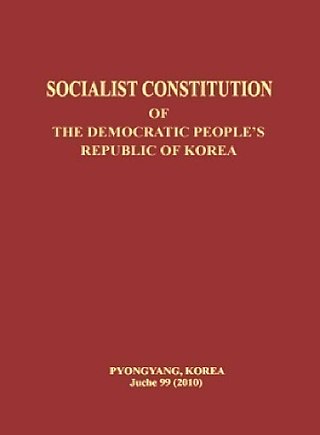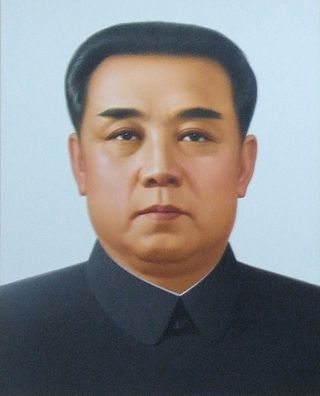
North Korea, officially the Democratic People's Republic of Korea (DPRK), is a country in East Asia. It constitutes the northern half of the Korean Peninsula and borders China and Russia to the north at the Yalu (Amnok) and Tumen rivers, and South Korea to the south at the Korean Demilitarized Zone. North Korea's border with South Korea is a disputed border as both countries claim the entirety of the Korean Peninsula. The country's western border is formed by the Yellow Sea, while its eastern border is defined by the Sea of Japan. North Korea, like its southern counterpart, claims to be the legitimate government of the entire peninsula and adjacent islands. Pyongyang is the capital and largest city.
The history of North Korea began with the end of World War II in 1945. The surrender of Japan led to the division of Korea at the 38th parallel, with the Soviet Union occupying the north, and the United States occupying the south. The Soviet Union and the United States failed to agree on a way to unify the country, and in 1948, they established two separate governments – the Soviet-aligned Democratic People's Republic of Korea and the American-aligned Republic of Korea – each claiming to be the legitimate government of all of Korea.

The politics of North Korea takes place within the framework of the official state philosophy, Kimilsungism-Kimjongilism. Juche, which is a part of Kimilsungism-Kimjongilism, is the belief that only through self-reliance and a strong independent state, can true socialism be achieved.

The economy of North Korea is a centrally planned economy, following Juche, where the role of market allocation schemes is limited, although increasing. As of 2022, North Korea continues its basic adherence to a centralized planned economy. With a total gross domestic product of $28.500 billion as of 2016, there has been some economic liberalization, particularly after Kim Jong Un assumed the leadership in 2012, but reports conflict over particular legislation and enactment. Since the 1990s, informal market activity has increased, which the government has tolerated. These markets are referred to as 'Jangmadang' and were formed as a result of the economic collapse during the 1990s, which made the regime unable to distribute food to its people.

North Korea has diplomatic relations with 160 states. The country's foreign relations have been dominated by its conflict with South Korea and its historical ties to the Soviet Union. Both the government of North Korea and the government of South Korea claim to be the sole legitimate government of the whole of Korea. The de facto end of the Korean War left North Korea in a military confrontation with South Korea along the Korean Demilitarized Zone.

Juche, officially the Juche idea, is the state ideology of North Korea and the official ideology of the Workers' Party of Korea. North Korean sources attribute its conceptualization to Kim Il Sung, the country's founder and first leader. Juche was originally regarded as a variant of Marxism–Leninism until Kim Jong Il, Kim Il Sung's son and successor, declared it a distinct ideology in the 1970s. Kim Jong Il further developed Juche in the 1980s and 1990s by making ideological breaks from Marxism–Leninism and increasing the importance of his father's ideas.

The Korean Central News Agency (KCNA) is the state news agency of North Korea. The agency portrays the views of the North Korean government for both domestic and foreign consumption. It was established on December 5, 1946, and now features online coverage.

Vinylon, also known as Vinalon, is a synthetic fiber produced from reaction between polyvinyl alcohol (PVA) fiber and formaldehyde. Chemically it is polyvinyl formal (PVF). Vinylon was first developed in Japan in 1939 by Ri Sung-gi, Ichiro Sakurada, and H. Kawakami. In North Korea, Ri Sung-gi found a route to produce PVA from domestic anthracite and limestone as raw materials. Trial production began in 1954 and in 1961 the massive "Vinylon City" was built in Hamhung, North Korea. Vinylon's widespread usage in North Korea is often pointed to as an example of the implementation of the Juche philosophy, and it is known as the Juche fiber.

The emblem of North Korea is a national symbol adopted in 1993 by the state. Its design is modified from the former version in use from the founding of North Korea in 1948. Prominent features on the emblem are a red star, a hydroelectric plant and Mount Paektu. The design bears similarities to the emblem of the Soviet Union and other emblems of the socialist heraldic style.

The cinema of North Korea began with the division of Korea and has been sustained since then by the ruling Kim dynasty. Kim Il-sung and his successor Kim Jong-il were both cinephiles and sought to produce propaganda films based on the Juche ideology.

The Socialist Constitution of the Democratic People's Republic of Korea is the constitution of North Korea. It was approved by the 6th Supreme People's Assembly at its first session on 27 December 1972, and has been amended and supplemented in 1998, 2009, 2012, 2013, 2016 and twice in 2019. It replaced the country's first constitution which was approved in 1948.

Songun is the "military-first" policy of North Korea, prioritizing the Korean People's Army in the affairs of state and allocation of resources. "Military-first" as a principle guides political and economic life in North Korea, with "military-first politics" dominating the political system; "a line of military-first economic construction" acting as an economic system; and "military-first ideology" serving as the guiding ideology.
The Communist movement in Korea emerged as a political movement in the early 20th century. Although the movement had a minor role in pre-war politics, the division between the communist North Korea and the anti-communist South Korea came to dominate Korean political life in the post-World War II era. North Korea, officially the Democratic People's Republic of Korea, continues to be a Jucheist state under the rule of the Workers' Party of Korea. In South Korea, the National Security Law has been used to criminalize advocacy of communism and groups suspected of alignment with North Korea. Due to the end of economic aid from the Soviet Union after its dissolution in 1991, due to the impractical ideological application of Stalinist policies in North Korea over years of economic slowdown in the 1980s and receding during the 1990s, North Korea continues to nominally uphold Communism, but has replaced Marxism-Leninism with the Juche idea. References to Communism were removed in the North Korean 1992 and 1998 constitutional revisions to make way for the personality cult of Kim's family dictatorship and the North Korean market economy reform. The Workers' Party of Korea under the leadership of Kim Jong Un later reconfirmed commitment to the establishment of a communist society, but orthodox Marxism has since been largely tabled in favor of "Socialism in our style". Officially, the DPRK still retains a command economy with complete state control of industry and agriculture. North Korea maintains collectivized farms and state-funded education and healthcare.

The Workers' Party of Korea (WPK) is the founding and sole ruling party of the Democratic People's Republic of Korea, commonly known as North Korea. Founded in 1949 from the merger of the Workers' Party of North Korea and the Workers' Party of South Korea, the WPK is the oldest active party in Korea. It also controls the Korean People's Army, North Korea's armed forces. The WPK is the largest party represented in the Supreme People's Assembly and coexists with two other legal parties making up the Democratic Front for the Reunification of Korea. However, these minor parties are completely subservient to the WPK and must accept the WPK's "leading role" as a condition of their existence. The WPK is banned in South Korea under the National Security Act and is sanctioned by the United Nations, the European Union, Australia, and the United States.

The law of North Korea is a codified civil law system inherited from the Japanese and influenced by the Soviet Union. It is governed by The Socialist Constitution and operates within the political system of North Korea.

Kim Il Sung was the leader of North Korea for 46 years, from its establishment in 1948 until his death in 1994.

On the Juche Idea is a treatise attributed to North Korean leader Kim Jong Il on the North Korean Juche ideology. It is considered the most authoritative work on Juche.

Upon its liberation in 1945 and subsequent foundation in 1948, North Korea adopted national symbols distinct from the national symbols of South Korea. The traditional flag of Korea, the Taegukgi, and the symbol Taeguk, were swapped for socialist symbols.

The State Affairs Commission of the Democratic People's Republic of Korea (SAC) is defined by the 2016 constitution as "the supreme policy-oriented leadership body of State power" over North Korea. The current president of the SAC, which is defined by the same constitution, is the head of state of the nation, the Supreme Leader of North Korea.

Officially, the Workers' Party of Korea (WPK) – the ruling party of North Korea – is a communist party guided by Kimilsungism–Kimjongilism, a synthesis of the ideas of Kim Il Sung and Kim Jong Il. The party is committed to Juche, an ideology attributed to Kim Il Sung which promotes national independence and development through the efforts of the popular masses. Although Juche was originally presented as the Korean interpretation of Marxism–Leninism, the party now presents it as a freestanding philosophy. The WPK recognizes the ruling Kim family as the ultimate source of its political thought. The fourth party conference, held in 2012, amended the party rules to state that Kimilsungism–Kimjongilism was "the only guiding idea of the party". Under Kim Jong Il, who governed as chairman of the National Defence Commission, communism was steadily removed from party and state documents in favour of Songun, or military-first politics. The military, rather than the working class, was established as the base of political power. However, his successor Kim Jong Un reversed this position in 2021, replacing Songun with "people-first politics" as the party's political method and reasserting the party's commitment to communism.

















